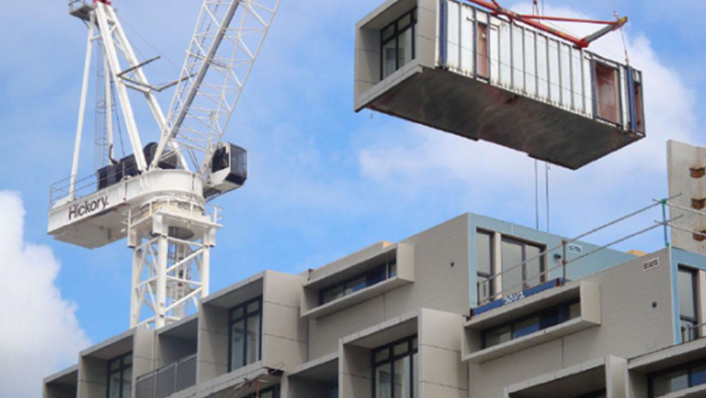
1.42 Innovative Industrialised Buildings: Accelerating the Mainstreaming of Building Manufacture in Australia

Project Number
1.42Round
Round 4Date
1 October 2015 - 31 March 2017Research Team

Chair, Project Steering Group
John V. McCarthy AO

Project Leader
Professor Peter Newman
PhD DipES&T BSc(Hons) FTSE
Curtin University
P.Newman@curtin.edu.au

Project Manager
Dr Charlie Hargroves
BE (Civil), PhD
Curtin University
charlie.hargroves@curtin.edu.au
Documents for Downloading
Presentations
Project 1.42 Innovative Industrialised Buildings, SBEnrc Boardroom Briefing, May 2017, Brisbane Australia (705Kb)
Academic Publications
Pham, L. ; Gad, E. ; Fernando, S. ; Hargroves, K. ; 2017. Performance framework for modular construction, ‘Mechanics of Structures and Materials: Advancements and Challenges’, Proceedings of the 24th Australasian Conference on the Mechanics of Structures and Materials (ACMSM24 2016), Perth, Western Australia, Australia, 6-9 December 2016 / Hong Hao and Chunwei Zhang (eds.), pp. 789-792
Hargroves, K., Hebert, L., Newman, P., Green, J. and Conley, D. Exploring Risks Risks and Rewards Associated with High Performance Manufactured Buildings, CIB World Sustainable Built Environment Conference 2017, 5-7 June 2017, Hong Kong (280Kb)
Hargroves, K., Newman, P., and Green, J. (2016) ‘Innovative Industrialised Buildings: Performance, Perceptions, and Barriers to Financing associated with Building Manufacturing’, Proceedings of the CIB World Building Congress, Tampere, Finland, May 30 – June 03, 2016 (386Kb)
Academic Database
Database of leading manufactured buildings (2017, 4Mb)
*note: this material is drawn from publicly available sources and we do not guarantee that it is updated or a true representation of the case study
Videos
Project Summary: Innovative Industrialised Buildings, August 2017 (2:05)
Full Video: Innovative Industrialised Buildings, August 2017 (5:23)
Accelerating the growth of building manufacturing in Australia presents significant opportunities for the building sector. Not only will it create highly coveted jobs, increase profits and building throughput, streamline the supply chain and reduce environmental pressures, it will also provide valuable transition opportunities for the automotive and manufacturing sectors. Such opportunities are being taken up around the world, especially in our region with some US$45 billion invested in building manufacture in the Asia-Pacific region in 2012.
The manufacture of buildings has the potential to provide high quality and cost-effective houses, apartments, office blocks and a range of other building types, utilising the technologies, materials, design know-how and construction experience currently in the building, automotive and manufacturing sectors. As with a number of other advanced industries, such as renewable energy technology, the current slow recognition of the value that can be created through the manufacture of buildings in Australia may lead to a significant missed opportunity.
It is clear that if Australia does not seize the opportunity of building manufacturing, foreign companies will certainly continue to bring it to market, which if not harnessed as part of the sector’s overall development could lead to job losses across the building sector and its supply chain. In practice however, the shift to aggregating construction of buildings in large-scale dedicated facilities, to be transported to site for erection, presents a number of challenges that will require innovative approaches to overcome.
Objectives
This project will build on previous SBEnrc findings by focusing on two key issues hindering the acceleration of building manufacture in Australia, namely: perceptions of performance and barriers to finance. When approaching perceptions of performance, the project will undertake a detailed review of as-constructed manufactured buildings in Australia to provide a third party comparison to onsite methods. When approaching barriers to finance, the project will develop a comprehensive high level report to provide a clear, unbiased and robust overview of the various barriers and existing precedent for overcoming them, to inform a stakeholder engagement process with the finance sector to ensure such options are being considered.
Industry Outcomes
The project seeks to reduce the influence of two key barriers associated with accelerating the mainstreaming of building manufacture in Australia, which is set to deliver significant wide-spread value. The building sector will see greater profits and throughout, clients will see buildings constructed much faster with greater returns on investment, workers will see significantly improved workplace conditions and buyers will see higher quality homes become more affordable. The SBEnrc has the opportunity to be instrumental in the industrialisation of an entire sector in Australia that will unlock significant economic, social and environmental benefits, quite a contribution to our nation!











